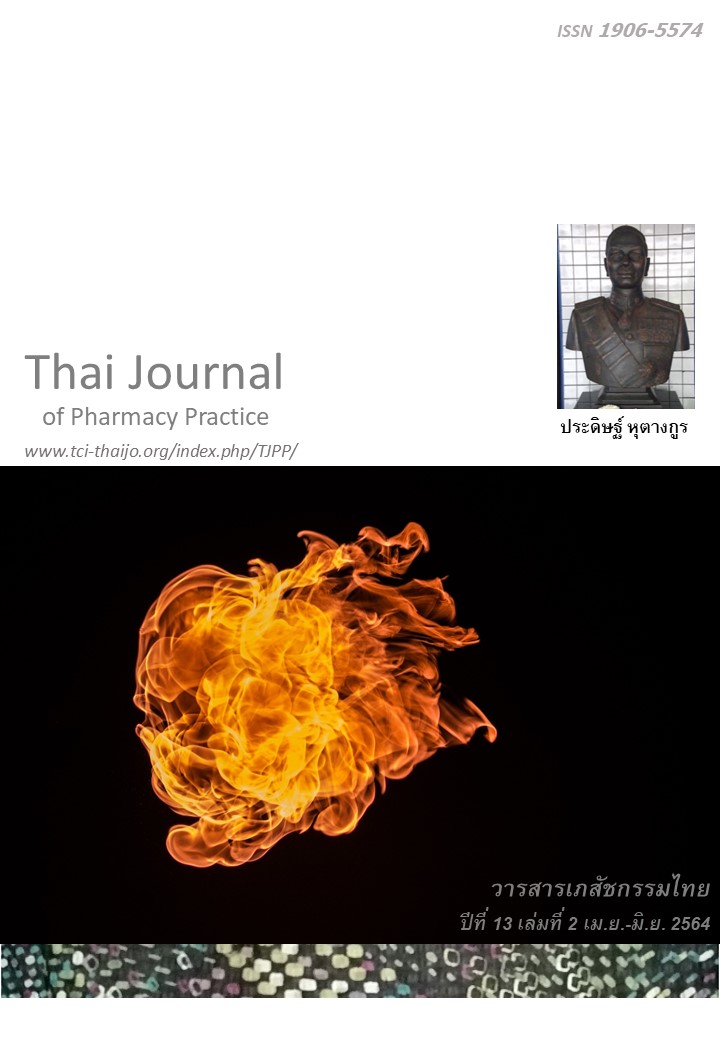ผลการสำรวจคุณภาพน้ำบริโภคในภาชนะบรรจุที่ปิดสนิทที่จำหน่าย ในแขวงเวียงจันทน์ สาธารณรัฐประชาธิปไตยประชาชนลาว
Main Article Content
บทคัดย่อ
วัตถุประสงค์: เพื่อสำรวจคุณภาพทางกายภาพ เคมี และจุลินทรีย์ของน้ำบริโภคในภาชนะบรรจุที่ปิดสนิท (น้ำบริโภคฯ) ที่จำหน่ายในแขวงเวียงจันทน์ สาธารณรัฐประชาธิปไตยประชาชนลาว (สปป.ลาว) วิธีการ: การศึกษานี้เป็นการวิจัยเชิงสำรวจที่เก็บตัวอย่างน้ำบริโภคฯ 41 ตัวอย่างจากโรงงานน้ำดื่ม 41 แห่งที่ยังไม่ได้รับทะเบียนอาหารและยาจากกรมอาหารและยากระทรวงสาธารณสุข สปป.ลาว ในปี พ.ศ. 2562 ซึ่งตั้งอยู่ในพื้นที่ 11 อำเภอ แขวงเวียงจันทน์ สปป. ลาว การศึกษาใช้ชุดทดสอบคุณภาพน้ำดื่มภาคสนามมาตรฐาน ประกอบด้วยชุดทดสอบอีโคไลและโคลีฟอร์มแบคทีเรีย วัดความกระด้างของน้ำดื่มด้วยเครื่องวัดทีดีเอส และวัดค่าความเป็นกรด–ด่างด้วยเครื่องวัดความเป็นกรดด่าง หลังจากนั้น นำผลมาเปรียบเทียบกับเกณฑ์มาตรฐานของกระทรวงสาธารณสุข สปป. ลาว เรื่อง น้ำบริโภคในภาชนะบรรจุที่ปิดสนิท ผลการวิจัย: น้ำบริโภคฯ 22 ตัวอย่าง (ร้อยละ 53.65) ไม่ผ่านเกณฑ์ด้านกายภาพคือไม่ระบุวันเดือนปีหมดอายุของน้ำดื่ม และคุณภาพด้านเคมีไม่ผ่านเกณฑ์มาตรฐานด้านค่าความเป็นกรด - ด่าง ที่น้อยกว่า 6.5 นอกจากนี้ค่าความเป็นกรด - ด่าง ที่มากกว่า 8.5 พบใน 2 ตัวอย่าง (ร้อยละ 4.87) ส่วนค่าความกระด้างของน้ำบริโภคฯ อยู่ในเกณฑ์มาตรฐานทุกตัวอย่าง น้ำบริโภคฯ จำนวน 35 ตัวอย่าง (ร้อยละ 85.36) ผ่านเกณฑ์ทางด้านจุลินทรีย์โดยตรวจพบโคลีฟอร์มแบคทีเรียที่มีค่าน้อยกว่า 2.2 MPN/100 มิลลิลิตร และไม่พบ อีโคไล น้ำบริโภคฯ 6 ตัวอย่าง (ร้อยละ 14.63) พบโคลีฟอร์มแบคทีเรียมากกว่าเกณฑ์ที่กำหนดและพบ อีโคไล สรุป: ถึงแม้ว่าโรงงานน้ำดื่มจะมีการใช้ระบบปรับคุณภาพน้ำที่ดีโดยการใช้ออสโมซิสแบบผันกลับ (reverse osmosis) การใช้แสงอัลตราไวโอเลต และใช้ระบบโอโซนเพื่อฆ่าเชื้อ ยังพบว่ามีโรงงานน้ำดื่มส่วนหนึ่งที่ไม่ผ่านเกณฑ์มาตรฐานทางเคมีและจุลินทรีย์ ดังนั้นผู้ประกอบการควรตระหนักถึงสุขลักษณะด้านอื่น ๆ โดยเฉพาะอย่างยิ่งในส่วนของบุคลากรให้มากยิ่งขึ้น เพื่อเป็นการพัฒนา ปรับปรุงคุณภาพน้ำดื่ม และส่งผลต่อความปลอดภัยของผู้บริโภค
Article Details
ผลการวิจัยและความคิดเห็นที่ปรากฏในบทความถือเป็นความคิดเห็นและอยู่ในความรับผิดชอบของผู้นิพนธ์ มิใช่ความเห็นหรือความรับผิดชอบของกองบรรณาธิการ หรือคณะเภสัชศาสตร์ มหาวิทยาลัยสงขลานครินทร์ ทั้งนี้ไม่รวมความผิดพลาดอันเกิดจากการพิมพ์ บทความที่ได้รับการเผยแพร่โดยวารสารเภสัชกรรมไทยถือเป็นสิทธิ์ของวารสารฯ
เอกสารอ้างอิง
Food and Agriculture of the United Nations. Laos country profile: The Lao country brief [online]. 2561 [cited Jan 29, 2019]. Available from: www.bbc.com /news/world-asia-pacific-15351898.
International Food Policy Research Institute (IFPRI). Nutrition country profile: Lao People’s Democratic Republic [online]. 2015 [cited Dec 18, 2019]. Available from: www.fao.org/3/ca0397en/CA0397 EN.
Souphasay K. Water quality monitoring and manage ment in Lao PDR. Vientiane: Water Resources and Environment Administration Lao PDR; 2009.
Food and Drug Department. Statistics of food: food report [online]. 2558 [cited Feb 9, 2020]. Available from: www.fdd.gov.la/showContent_en.php?contI D=15.
World Health Organization. Regional workshop of the International Network on Household Water Treatment and Safe Storage [online]. 2014 [cited Feb 9, 2020]. Available from: www.afro.who.int/ news/inter-regional-workshop-household-water-treatment-and-safe-storage.
Food and Drug Department. Vientiane Province report on the food quality monitoring year 2017 [online]. 2018 [cited Dec 10, 2020]. Available from: www.fdd.gov.la/showContent_en.php?contID=5.
Food and Drug Department. Country report on the food quality monitoring 2012-2017 [online]. 2018 [cited Jan 20, 2020]. Available from: www.fdd.gov .la/showContent_en.php?contID=21.
Bureau of Food and Water Sanitation, Department of Health, Ministry of Public Health: Determination of safety of drinking water in households and schools [online]. 2005 [cited Jan 1, 2020]. Available from: www.foodsan.anamai.moph.go.th /download/kpi2-3.doc.Thai.
Food and Drug Department. Vientiane Province report on the food quality monitoring 2018 [online]. 2019 [cited Jan 3, 2020]. Available from: www.fdd. gov.la/index_en.php.
Notification of the Ministry of Public Health on Drinking Water in Seal Container (Issue 2) B.E. 2549.
Richard S. Use of 70% alcohol for the routine removal of microbial hard surface bioburden in life science cleanrooms. Future Microbiol 2013; 10: 1123-30.
Ongsara N, Sungpud J, Liamtong S. Microbiological quality of drinking water at Nakhon Si Thammarat Rajabhat University. Wichcha Journal Nakhon Si Thamarat Rajabhat University 2555; 2: 12-21.
World Health Organization.World data atlas [online]. 2018 [cited Feb 3, 2020]. Available from: www.lsb.gov.la/en/home.
Nimrat S, Vuthiphandchai V. Monitoring quality of bottled drinking water sold in Chachoengsao province Thailand. Rajamangala University of Technology Isan Journal Science and Technology 2016; 9: 30-128.
Nimrat S, Vuthiphandchai V. Physical and microbiological quality of bottled drinking water distributed in Nan Province. Journal of Science and Technology Ubon Ratchathani University 2014; 16: 104-111.
Darncholvichit IS. The related factors of drinking water standard for drinking water manufacturers in Phitsanulok. Journal of Disease Prevention and Control 2019; 6:42-54.
Bounthanome P. Quality of bottled drinking water and describe sanitation conditions of factories registered to the food in Vientiane Province Capital : Lao PDR. Khon kaen: Khon kaen University; 2007.
Nimrat S, Vuthiphandchai V. The Quality of bottled drinking water distributed in Uttaradit Province. Journal of Science and Technology Ubon Ratchathani University. 2019; 21: 199-212.


